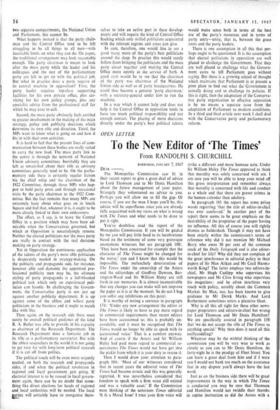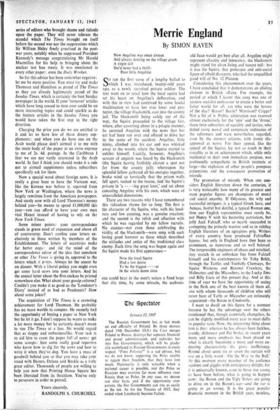To the New Editor of 'The Times' OPEN LETTER From
RANDOLPH S. CHURCHILL BARBADOS, JANUARY 7, 1967 DEAR
The Monopolies Commission saw fit in their recent report to give a great deal of advice to Lord Thomson and to Mr Denis Hamilton about the future management of your paper. Strangely they volunteered no advice to you. Perhaps you will allow me to fill the gap. Of course, if you are the man I hope you'll be, this advice will be superfluous since you are already fully acquainted with my views on what is wrong with The Times and what needs to be done to put it right.
You've doubtless read the report of the Monopolies Commission. If you will be guided by me you will pay little heed to its lucubrations based on the testimony of some very grotesque anonymous witnesses but see paragraph 100: 'They have been concerned for example that the character of The Times might be changed for the worse;' you and I know that this would be impossible. The melancholy deterioration of The Times under the ownership of the Astors and the editorships of Geoffrey Dawson, Bar- rington-Ward and Sir William Haley are still fresh in our memories. It is almost inconceivable that any changes you can make will not improve the paper as it is at the moment. So do not I beg you suffer any inhibitions on this point.
It is worthy of noting a sentence in paragraph 174: 'Under any new arrangement the editor of The Times is likely to have to pay more regard to commercial requirements than recent editors have been accustomed to; this is probably un- avoidable, and it must be recognised that The Times would no longer be able to speak with its accustomed voice.' That is a comfort anyway. And of course if the Astors and Sir William Haley had paid more regard to commercial re- quirements The Times would not have got into the pickle from which it is your duty to rescue it.
Then I would draw your attention to para- graph 104: 'Most of our witnesses considered that in recent years the editorial voice of The Times had become erratic and this was generally regretted. It was nevertheless considered that freedom to speak with a firm voice still existed and was a valuable asset.' If the Commission were thinking of the notorious Times editorial 'It Is a Moral Issue' I trust your firm voice will strike a different and more humane note. Under Sir William Haley The Times appeared to think that morality was solely concerned with sex. I am sure you will be able to keep your mind off this gross interpretation and remember always that morality is concerned with life and conduct as a whole and that there are graver crimes in the human calendar than adultery.
In paragraph 181 the report has some prissy words regretting 'that the title of editor-in-chief was ever conferred.' In another part of the report there seems to be great emphasis on the desirability of the proprietor of the paper having no influence. All this of course you will rightly dismiss as balderdash. Though it may not have been strictly within the commission's terms of reference why did it not mention Mr Michael Berry who owns 50 per cent of the common stock of the Daily Telegraph and is also editor- in-chief for life? Why did they not complain of the great interference in editorial policy in their papers of Sir Max Aitken and Mr Cecil Harms- worth King? The latter employs two editors-in- chief, Mr Hugh Cudlipp who supervises his newspapers and Mr Clive Irving who supervises his magazines: and he often interferes very much with policy, notably about the Common Market. Sir Max, too, has been known to give guidance to Mr Derek Marks. And Lord Rothermere sometimes utters a plaintive bleat.
Why is all this all right for these other news- paper proprietors and editors-in-chief but wrong for Lord Thomson and Mr Denis Hamilton? We are specifically assured in paragraph 158 that 'we do not accept the role of The Times as anything special.' Why then does it need all this mollycoddling?
Whatever may be the wishful thinking of the commission you will be very wise to work as closely as you can to Mr Denis Hamilton. At forty-eight he is the prodigy of Fleet Street. You can learn a great deal from him and if I were you I would not bank too much on the assurance that in any dispute you'll always have the last word.
Just as on the business side there will be great improvements in the way in which The Times is conducted you may be sure that Thomson and Hamilton would not twiddle their thumbs in supine inattention as did the Astors with a series of editors who brought shame and ridicule upon the paper. They will never tolerate the scandal which The Times brought on itself before the second war nor the suppressions which Sir William Haley freely practised in the post-
war years, notably when he suppressed President Kennedy's message congratulating Mr Harold Macmillan for his help in bringing about the nuclear test ban treaty. It was mentioned in every other paper : even the Daily Worker.
So far this advice has been somewhat negative: let me be more positive. You must try and make Thomson and Hamilton as proud of The Times as they are already legitimately proud of the Sunday Times, which is certainly the best Sunday newspaper in the world. If your 'turnover' articles which have long ceased to turn over could be on more interesting topics and could sparkle as do the feature articles in the Sunday Times you would have taken the first step in the right direction.
Charging the price you do we are entitled to it and let us have less of those dreary sup- plements: and when you do have one on the Arab world please don't airmail it to me with the main body of the paper at an extra expense to me of 2s. 4d. postage. In the Caribbean I fear we are not vastly interested in the Arab world. In fact I think you should make it a rule not to airmail supplements unless subscribers specifically ask for them.
Now a special word about foreign news. It is really a great bore to have the Vietnam war, like the Korean war before it, reported from New York or Washington, where the news is largely rewritten from the American newspapers. And surely now with all Lord Thomson's money behind you—he means to spend £1,000,000 this year—you can afford to have your own man visit Hanoi instead of having to rely on the New York Times.
Some minor points: your correspondence stands in grave need of expansion and above all of controversy. Don't confine your letters ex- clusively to those written by members of the Establishment. The letters of eccentrics make far better copy : and rid the mind of the correspondence editor of the idea that somehow or other The Times is giving its approval to the letters which it prints. Always let the accent be on dissent. With a liberal policy you might even get some hard news into your letters. And let the annual letter about the first cuckoo be printed somewhere else. What about your gossip column? Couldn't you make it as good as the 'Londoner's Diary' instead of as bad as Pendennis? How about some jokes?
The acquisition of The Times is a =owning achievement for Lord Thomson. He probably has no more worlds to conquer. He recently had the opportunity of buying a paper in New York but he let it go. I don't suppose he wants to mate a lot more money but he certainly doesn't mean to run The Times at a loss. He would regard that as sloppy and unbusinesslike. Your task is to aid him to cram the paper full of news: get some scoops: hire some really good reporters who know how to dig for the news and how to write it when they've dug. You have a mass of goodwill behind you so that you may take your stand with Barnes, Delane and Buckle as a truly great editor. Thousands of people are willing to help you now that Printing House Square has been liberated from its thraldom. You've only to persevere in order to prevail.
Yours sincerely, RANDOLPH S. CHURCHILL































 Previous page
Previous page